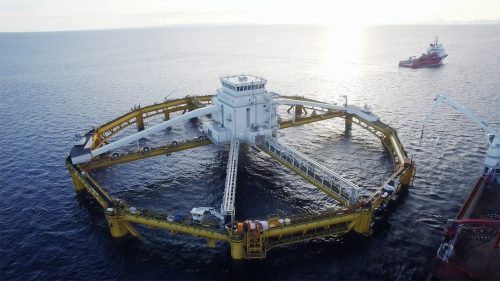Salmon farming pioneer Salmar Aker Ocean is mulling the next phase of the development of a new semi-offshore unit and expects to reach an investment decision before the yearend.
It is also working on the regulatory front, having submitted this past May a proposal to local authorities for a regulatory framework for offshore farming in Norway. It is collaborating will the government, industry, and other stakeholders for the establishment of a regulatory framework, it said.
“SalMar Aker Ocean is committed to new offshore investments as soon as a regulatory framework is in place,” said parent company Aker, which holds 15 percent of the shares in SalMar Aker Ocean, during the announcement of its Q2 2022 financials on Tuesday.

The promise of offshore
SalMar Aker Ocean believes its Ocean Farm offshore fish farm technology will be able to fill the production gap as near-shore farming sites are reaching maximum capacity, while also avoiding many of the potential conflicts with other user groups, such as fisheries or tourism.
The new semi-offshore unit currently being designed will build on the learnings from Ocean Farm 1, the world’s first offshore fish farm.
The first-generation farm measures 360-foot wide and is designed to accommodate water for farming 1.5 million fish. The new one will be a significantly larger structure, its capacity will be 23,000 tonnes (versus 10,000 tonnes for the Ocean Farm 1).
Since it started operations in November 2017, Ocean Farm 1 has produced 10,000 tonnes of salmon over two production cycles; the latest one was completed in 2020. Currently, it is in Aker Solution’s shipyard in Verdal, Norway for maintenance and upgrade. The farm will commence the next production cycle in the spring of 2023.
SalMar Aker Ocea is a partnership between salmon producer SalMar and industrial software and environmental technology expert Aker. It aims to produce 150,000 tons of salmon annually by 2030 by utilizing its technology in the deep sea.


